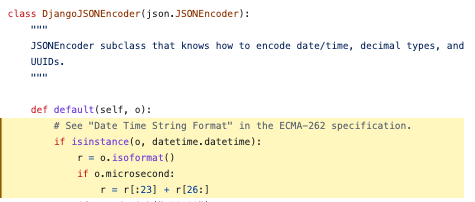Django’s JSON encoder rounds datetimes down to the nearest millisecond
Django provides a custom DjangoJSONEncoder class that can
encode datetime.date, datetime.datetime, decimal.Decimal and uuid.UUID
types.
Beware though: this class serializes datetime.datetime instances to
millisecond precision only. Since Python’s datetime.datetime type supports
microsecond precision, the serialisation process can change the datetime’s
value.
Watch:
>>> import datetime
>>> import json
>>> from django.core.serializers.json import DjangoJSONEncoder
>>>
>>> # Create a datetime with sub-millisecond precision.
>>> dt = datetime.datetime(2022, 12, 1, 14, 0, 0, 1234)
>>> dt.isoformat()
"2022-12-01T14:00:00.001234"
>>>
>>> # Serialize the datetime using Django's encoder.
>>> print(json.dumps(dt, cls=DjangoJSONEncoder))
"2022-12-01T14:00:00.001"
As the above snippet illustrates, serialising a datetime.datetime effectively
rounds it down to the nearest millisecond.
Why?
This rounding is deliberate.

It’s done to ensure serialized datetime strings conform with the ECMAScript
262 language specification which mandates millisecond precision.
Ultimately, this is because the JavaScript Date object only
supports millisecond precision.
Broken tests
This is a gotcha that can effect tests that compare datetime values that get
serialized and deserialized (which is how I stumbled upon it).
If you need to perform the same rounding in Python code, use something like:
rounded_dt = dt.replace(microsecond=dt.microsecond // 1000 * 1000)